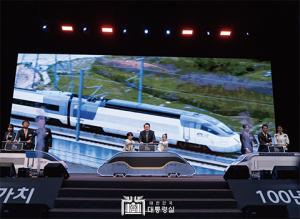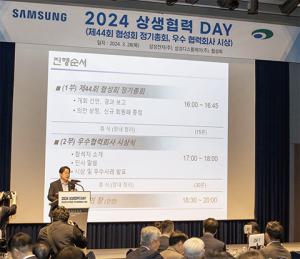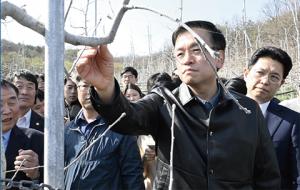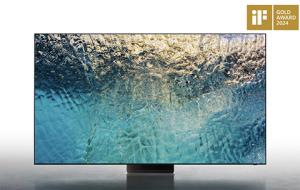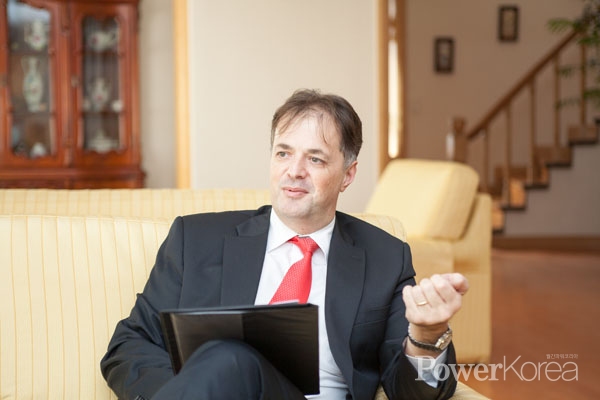 |
처버 가보르 주한 헝가리 대사
한-헝가리 수교 25주년 맞아 '친근한' 나라로 나아간다
기업 투자 유치, 문화적 교류 이어갈 것
지난 해 11월 27~29일 3일 동안 빅터 오르반 헝가리 국무총리가 외교통상부, 경제부, 국가발전부, 국방부, 인적자원부 장관과 110명의 헝가리 대표 사업가들과 함께 한국을 방문했다. 이 자리에서는 헝가리 장학제도(100명의 한국 학생들이 헝가리의 유명대학에서 장학생으로 공부 할 수 있는 프로그램)와 양국 지정항공사 간 편명 공유를 허용해 우리항공사의 영업환경은 개선하는 개정 한공운송 협정 등이 체결됐다. 또한 야노쉬 아데르 헝가리 대통령도 올해 4월 12~17일 대구에서 열리는 세계 워터 포럼에 참여해 양국 간의 지속적 발전협력 등에 관해 논의할 예정이다.
"한국과 헝가리는 공통점 많다", 2014년 한-헝가리 수교 25주년 맞아
처버 가보르 주한 헝가리 대사는 주미 헝가리 대사관에서 미국관련 정책관으로 일하고 주호주 헝가리대사, 주뉴질랜드 헝가리대사를 거쳐 2013년 9월 한국으로 부임했다. 수교 25주년을 한국에서 맞은 그는 아시아 국가 중 첫 근무지인 한국이 "헝가리와 공통점이 많아서 마치 집에 사는 느낌"이라는 감상을 전했다. 예를 들어, 헝가리는 이름을 표기할 때 우리나라처럼 성을 먼저, 이름을 나중에 쓴다. 또한 헝가리의 대표적 전통음식인 굴라쉬(Goulash)는 쇠고기에 양파, 파프리카 등 각종 채소를 넣고 매운 양념으로 끓인 스프로 매운 음식을 즐기는 한국인들에게 친숙한 맛을 낸다.
주한 헝가리 대사관에서는 최근 헝가리 문화를 한국에 알리기 위한 활동을 지속하고 있다. 지난해에는 양국 수교 25주년을 기념하기 위해 2013년 12월에서 2014년 3월까지 국립고궁박물원에서 17~19세기 헝가리 귀족들의 생활상을 전시했으며, 5월 1일에는 우리나라의 양금과 유사한 형태인 헝가리 전통악기 침볼럼 연주회가 예술의 전당에서 열렸다. 한국에 거주하는 헝가리인 협회에서는 한국예술종합학교에 이 악기를 기증하기도 했다. 또 6월 19일에는 수원문화축제에 헝가리 국립 필하모닉 오케스트라가 참여하기도 했는데, 실제로 헝가리는 음악으로 유명해 많은 한국인 유학생들이 학업 과정을 밟고 있는 곳이기도 하다.
향후 한국 기업의 투자를 본격적으로 유치할 계획
헝가리는 체제전환 이후 1999년 NATO에, 2004년 5월에는 EU에 가입했고 현재는 중부유럽 국가들과 함께 경제발전을 도모하고 있다. 가보르 대사는 "헝가리는 유럽의 중앙에 위치해 있다는 지리적 조건, 숙련된 노동력, 혁신적인 사회기반시설 그리고 합리적 가격으로 향후 많은 한국 기업들의 투자를 유치할 계획"이라고 밝혔다. 13명의 노벨 수상자와 함께 볼펜을 개발한 라즐로 비로, MS워드와 엑셀을 개발한 카롤리 시모니 등 다수의 발명가를 배출한 국가답게 고등교육과 연구&개발(R&D) 분야에 잠재력을 가지고 있기 때문이다.
가보르 대사는 또 "유연한 노동시장과, 아주 저렴한 법인세율(10~19%), 소득세율(16%), 그리고 특별 인센티브를 제공하기 때문에 한국 대기업에 속한 연구센터는 물론 중소기업들의 투자도 이끌어낼 수 있을 것"이라고 했다. 실제로 1989년 삼성이 헝가리에 진출한 이후 현재까지 한국타이어, KDB은행 등 50여개 한국회사가 약 2조원을 헝가리에 투자했고, 특히 삼성전자와 한국타이어는 헝가리 정부와 전략적 파트너십 협정을 체결한 상태다.
한편 헝가리 기업의 한국 내 활동 가능성에 대해 가보르 대사는 "헝가리가 경제발전에 박차를 가한 것은 26년 정도라 제조부분은 거의 외국계회사의 투자에 의해 운영되고 있고, 헝가리 회사들은 아직 자본력이 강하지 않아 한국에서 사업을 진행하기엔 어려움을 겪고 있다. 하지만 헝가리의 새로운 기술과 한국의 제조기반을 통해 합작투자회사를 만드는데 많은 잠재력이 있다고 생각한다"고 언급했다.
"한국 문화에 다양한 관심, '대장금' 비롯해 한국영화제도 열려"
한국과 헝가리를 친근한 나라로 만들고 싶다
양국간 수교를 맺기 전에도 애국가를 작곡한 안익태 선생이 1938~1941년 리스트 음악원에서 유학 생활을 하면서 양국의 문화 교류가 시작되었다고 할 수 있다. 또한 2012년에는 헝가리·한국 친선협회와 서울특별시가 공동으로 추진한 안익태 선생의 흉상 제막식이 열리기도 했다. 부다페스트 경제전문대학교(Budapesti Gazdasági Főiskola)를 비롯한 여러 학교에 한국 관련 학과나 강좌가 개설되어 있으며 2008년부터 유럽에서는 최초로 드라마 ‘대장금’ 을 방영해 한류열풍을 일으켰다. 이후 '선덕여왕', '동이' 등 사극이 인기를 끌다가 2013년 3월에는 트렌디드라마인 '파스타'가 방영되었다.
가보르 대사는 "헝가리 사람들은 한국 문화에 관심이 많다. 2009년 6월 22~26일 우라니아 국립영화극장에서 수교 20주년 기념 한국영화제가 열렸다. '밀양', '집으로', '기담', '음란서생', '8월의 크리스마스', 등의 영화가 상영되었으며, 그 밖에도 매년 ‘한국영화주간’을 개최해 2012년에는 김기덕 감독의 ‘빈집’ 등 네 작품이 선보였다. 또한, 2012년에는 한국문화원이 문을 열었다"며 "아내와 두 딸과 함께 한국에 거주하고 있는데 정말 빠르게 움직이는 도시인 서울에서도 왕궁과 박물관들, 남산 등 여유를 찾을 수 있는 공간이 인상적이었고 경주, 설악산, 양평, 아침고요수목원도 정말 좋았다"는 말을 전했다.
그는 또 "헝가리에는 많은 고대도시, 성, 강과 호수 그리고 22개 와인 생산지가 있다. 나라의 중앙으로 다뉴브 강이 흐르고 있어 이를 따라가다 보면 많은 역사적인 건물들을 볼 수 있다. 또한 유럽에서 가장 큰 따뜻한 호수인 발라톤(Balaton)에 가면 근처에서 온천을 즐길 수 있고 8개의 유네스코 문화유산이 존재하는 나라"라며 헝가리를 많이 찾아달라는 말을 남겼다. 가보르 대사는 끝으로 "오랜 기간 교류를 유지해온 만큼 헝가리를 '친근한' 나라로 만들고 싶다"는 계획을 전하며 미소를 건넸다.
Csaba Gábor, the Ambassador of Hungary
Celebrating the 25th anniversary of diplomatic relations enhances friendly cooperation
Continuous business investment and cultural exchange
November 27-29 last year, Hungarian Prime Minister Viktor ORBÁN with a delegation of five Cabinet Ministers including Foreign Affairs and Trade, National Economy, National Development, Defense, and Human Capacities, as well as 110 Hungarian businessmen visited Korea. Several agreements were signed during the visit including a Hungarian state scholarship that can invite up to 100 Korean students to study at prestigious universities in Hungary as well as an Air Services Agreement. Also, Hungarian President János ÁDER is scheduled to attend the 7th World Water Forum in Daegu (April 12-17 2015) and will likely have other bilateral programs as well.
“Hungary and Korea have many things in common”
H.E. Gábor CSABA is a U.S. expert trained in his country’s foreign ministry since he joined in the mid-1990s. He worked at the Hungarian Embassy in the US and served as the Ambassador of Hungary to Australia and New Zealand before he was appointed in September 2013 to be Hungary’s Ambassador in Seoul. He was happy to be part of several programs celebrating the 25th anniversary of Hungary-Korea diplomatic ties in Korea. In fact, Korea is the first Asian country in which he takes the office as an ambassador. H.E. Gábor Csaba says “As I found that Hungary and Korea have many things in common, I feel pretty much at home. For example, we use our family name first like Koreans, unlike European countries that use it the other way round. Also, our traditional soup called ‘Goulash’ has a similar taste to those Korean foods based on their spiciness with the ingredients of beef and onion.”
Meanwhile, the Hungarian Embassy is actively engaged in spreading Hungarian culture in Korea. An exhibition on the 17-19th century Hungarian aristocracy was held at the National Palace Museum between December 2013 and March 2014 attracting well over half a million visitors, and a traditional Hungarian musical instrument ‘cimbalom’ (similar to Korea’s Yanggeum) was donated by the Hungary-Korea Society at a special concert held at the Seoul Arts Center last May. In addition, the Hungarian National Philharmonic Orchestra participated in the Suwon Cultural Festival in June. As Hungary has many famous figures in music including Liszt, Bartók and Kodály and is well-known for its high standards in music education, many Koreans are currently studying in music colleges in Hungary.
Planning to actively promote investments by Korean companies
After its transition, Hungary joined NATO in 1999 and the EU in 2004 and is also a member country of the Visegrad Group (V4: the Czech Republic, Hungary, Poland and Slovakia). H.E. Gábor Csaba says “the advantage of our location in Central Europe, our highly skilled workforce, well developed infrastructure and competitive prices have already attracted investments from many Korean companies.” Hungary has a great potential in R&D and higher education with the country having produced 13 Nobel Prize winners as well as a number of famous inventors such as László Bíró, who invented the ballpoint pen, and Károly Simonyi, who invented MS Excel, just to name a few. H.E. Gábor Csaba says “with our very flexible labor market, remarkably low corporate (10 or 19 per cent depending on the size of the companies) and income tax (16 per cent) rates as well as special incentives, we will certainly encourage more investments from Korean SMEs and the research centers of larger companies.” In fact, since Samsung first entered the market in 1989, some 50 Korean companies have invested $2 billion in Hungary, and Samsung and Hankook Tire have signed a strategic partnership agreement with the Hungarian government. Regarding the possibility of Hungarian companies’ operation in Korea, H.E. Gábor Csaba said “it has been only 26 years since Hungary transformed its economy in a fundamental way. There has been a lot of investment by foreign companies in our manufacturing industry and while Hungarian companies are getting stronger, they still need some time to reach the point when they can establish some significant business presence in a distant country like Korea. But I certainly see potential, for instance, in joint ventures between Hungarian and Korean companies with our companies providing the new technology and your side the manufacturing base and market access to Asia.”
Popularity of Korean culture in Hungary demonstrated through Korean Film Festivals
Hungary and Korea to be closer than ever through various cultural exchanges
Even before the diplomatic ties between the two countries, some cultural ties were already established when Ahn Eak-tae studied with such renowned Hungarian music professors as Zoltán Kodály and Leo Weiner in Budapest in 1938-1941. In 2012, the Hungary-Korea Society erected a bust in his honor, which stands in Budapest’s City Park. Some universities have Korean related departments including the Business School of Budapest and the Eötvös Lóránd University, and a popular Korean costume drama ‘Daejanggeum’ (Jewel in the Palace) was broadcast in Hungary in 2008 for the first time in Europe, followed by other costume dramas such as ‘Queen Sunduk’ and ‘Dongi’, and a trendy drama like ‘Pasta’ in 2013.
H.E. Gábor Csaba says “Hungarian people are very much interested in Korean culture.” The Korean Film Festival celebrating the 20th anniversary of diplomatic relations in 2009 showed a variety of Korean films including ‘Secret Sunshine’, ‘The Way Home’, ‘Epitaph’, ‘Lewd Scholar’, and ‘Christmas in August’. A ‘Korean Film Weekly’ is held every year, which showed 4 Korean films including ‘3-Iron’ by Kim Kiduk in 2012. A Korean Culture Center was opened in the same year in Budapest. H.E. Gábor Csaba is currently living with his supportive wife and two little daughters in Seoul. He says “the pace of life in Seoul is really fast, but we have already found a nice rhythm that works fine for us. We are in the process of exploring Seoul and are especially impressed by the royal palaces, the museums and the scenery (e.g. Namsan Tower), as well as Gyeongju, Seoraksan National Park, Youngpyong and the Garden of the Morning Calm.” When asked about tourist attractions in Hungary, H.E. Gábor Csaba advised “Hungary has a multitude of beautiful old towns, castles, lakes and 22 wine regions. If you walk along the Danube River, which runs through the center of the capital, you can see many historical buildings. You can also enjoy a great variety of spas, have a swim in the largest lake in Europe called ‘Balaton’, not far from Budapest and 8 UNESCO World Heritage sites in Hungary will also give you a breathtakingly beautiful scenery.” H.E. Gábor Csaba added that he would like both countries to be closer than ever before through various cultural exchanges and he will do his best in pursuit of that goal until he finishes his term in Korea.
김종관 기자 powerkorea_j@naver.com

